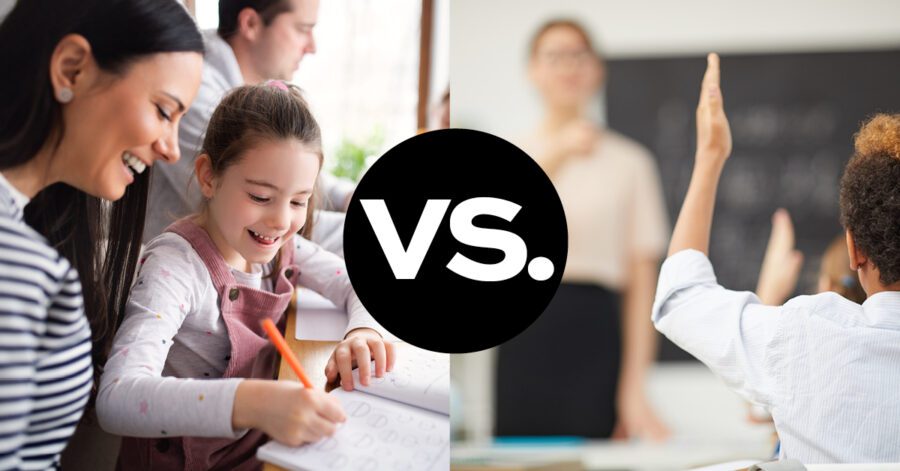At some point, you’ve probably heard the question asked (or maybe you’ve asked the question): why homeschool when your child can go to a public school funded by the government?
But perhaps we should flip that question around. Homeschooling has grown in popularity with families throughout the United States. Several studies suggest that between 5 and 6 percent of school-age children are homeschooled (that’s about three million kids), and this number increases year by year. During the COVID-19 pandemic, many parents found themselves homeschooling either outright or de facto—and that hands-on experience only increased the popularity of homeschooling!
Why is homeschooling more attractive than public schools and traditional schooling to these parents?
Why Homeschool?
There are more reasons to homeschool than ever, but here are five reasons in particular why parents are choosing to homeschool their children in increasing numbers.
1. Religious Freedom
Religious freedom is one of the most repeated answers offered by parents when making the decision to homeschool their child. Public schools don’t incorporate religious studies into the classroom. Public school curricula may teach a different set of values and beliefs than what parents believe and want to instill in their child.
Homeschooling, on the other hand, affords parents the opportunity to incorporate Bible studies, prayers, and values throughout the lesson plan.
Interested in homeschooling freedom?
Bookmark the Homeschool Freedom Action Center.
2. Academic Excellence
Parents also often choose to homeschool because public education severely underwhelms them. These parents pursue homeschooling as a means to academic excellence.
Homeschools by definition have better teacher-to-student ratios than public schools, which means that homeschooled students benefit from more frequent one-on-one attention. Also, in a home school, the parents control the curriculum, which means parents can ensure the content is worthwhile.
3. Safety and Security
Concern over a child’s safety is another reason why so many parents choose to homeschool. Some children are subjected to negative influences such as bullying, unhealthy social dynamics, and the presence of drugs and alcohol in public schools.
However, in a homeschool environment, parents are able to monitor their development without those unhealthy stressors and dangers.
4. Personalized Learning
In a homeschool setting, parents are able to offer more personalized learning for their child. Public school teachers have a classroom of students with different abilities and levels of learning. The lesson plans won’t be tailored for each individual student.
Homeschool allows for the parents to assess their child’s strengths and weaknesses and help build lessons around their needs. This type of teaching provides flexibility to give the child what he or she needs to learn and skip ahead if they grasp the subject.
5. Family Time
Homeschooling is a family effort. There is collaboration between children and parents to come together and share knowledge and experiences. This level of connectedness goes beyond what can be provided in public schools.
The opportunity to reinforce family values and beliefs while developing a stronger sense of self is why many families choose homeschooling over public schooling.
Want more reasons to homeschool?
Read: “The Benefits of Homeschooling: A Graduate’s Perspective”
Why Not Public School?
These are a few reasons why homeschool parents often decide to homeschool their children rather than send them to public school. Here are four such reasons:
1. Lower Academic Outcomes
Studies have revealed that homeschool students typically score higher than public school students on standardized tests. Parents’ level of education do not change the student’s success.1https://www.nheri.org/academic-achievement-homeschool-students/
Homeschool students also typically do better in college. Homeschool students have a higher rate of graduating college than students who attended public school. One study revealed that homeschooled students graduated with an average GPA of 3.46 while their public school peers graduated with an average of 3.16. The same study also showed that homeschooled students graduated from college at a higher rate (66.7%) than their peers (57.5%).2https://www.nheri.org/research-facts-on-homeschooling/3https://www.cbsnews.com/news/can-homeschoolers-do-well-in-college/
2. Poorer Social Environments
Contrary to the popular misconception, homeschool students are often better socialized than their public school counterparts. They are more likely to participate in political drives, sports teams, church ministries, and community work.4https://www.tandfonline.com/doi/full/10.1080/15582159.2017.1395638
Public schools, meanwhile, often present challenges for social development, such as bullying, discouragement, and negative peer influences. For example, according to one study, 5% of students between the ages of twelve and eighteen reported that they had been afraid of attack or harm at school in 2019.5https://nces.ed.gov/fastfacts/display.asp?id=49
That’s 1 out of 20 students, and the average class size in the USA is 20.3.6https://nces.ed.gov/surveys/ntps/tables/ntps1718_fltable06_t1s.asp
3. Lack of Individualized Attention
Public schools often have large class sizes (in fact, the average elementary class size is 21.1, and the average secondary school class size is 26.8)7 https://www.oecd.org/education/school/talis-excel-figures-and-tables.htm, making it challenging for teachers to provide individualized attention to each student. In particular, students with specific learning needs may not get the support they require.
4. One-Size-Fits-All Approach
Public education adopts a “one-size-fits-all” approach. The curriculum is standardized and advances forward with no regard to the student’s development, following fixed schedules and often either ignoring specific learning needs or creating new problems and further inflexibilities with Individualized Education Plans.
The evidence is abundant and the collective experience of homeschoolers shows that homeschooling works. Public schools, on the other hand, afford poorer outcomes all around.
Why send your child to public school when you can homeschool?




